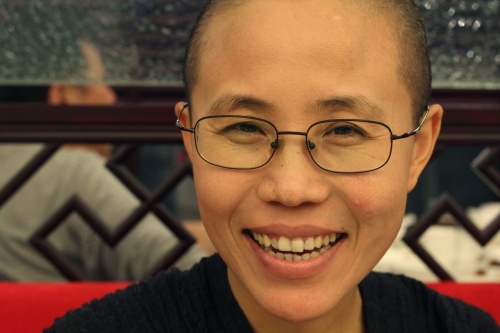Liu Xia, the widow of recently deceased activist Liu Xiaobo, has been living under house arrest and surveillance since her husband won a Nobel Peace Prize in 2010 while serving an 11-year prison sentence for “inciting subversion of state power.” Liu Xia was last seen in state media images from Liu Xiaobo’s funeral last month, and a continued lack of clarity about her whereabouts led to concerns that she was still being held in custody despite never having been officially charged with a crime. In August, her attorney filed a formal complaint to the U.N. condemning Beijing for her “enforced disappearance.”
Ahead of U.S. President Donald Trump’s first state trip to China, PEN America has organized an open letter to Xi Jinping calling for Liu Xia’s release from house arrest and lifting of all remaining restrictions on her speech and movement. The letter has been signed by 53 high-profile global literary figures—including Margaret Atwood, Chimamanda Adichie, George Saunders, and Philip Roth. PEN is also inviting public e-signatures to the petition. From the letter:
TO:
His Excellency Mr. Xi Jinping
President of the People’s Republic of China
Zhongnanhai, Xichengqu
Beijing
The People’s Republic of ChinaYour Excellency,
As writers, artists, and supporters of PEN America, we write to express our concern over the continued detention of poet Liu Xia. We ask you to remove all remaining restrictions on Liu Xia, including over her freedom of movement, and to permit her to meet and speak freely with others including her family, friends, and members of the media.
[…] Although Chinese officials claim that she is free, the circumstances make it clear that she remains in a state of de facto incommunicado detention, cut off from the outside world and barred from making her own free decisions regarding whom to speak with and where to travel.
[…] China’s Constitution also guarantees freedom of speech (Article 35), freedom of person (Article 37), and freedom and privacy of correspondence (Article 40), all rights which are implicated by the continuing detention of Liu Xia, which has no apparent legal basis.
We also appeal to your conscience and your sense of compassion. Liu Xia has undergone great suffering for many years, simply for being the wife of a man that China has deemed to be a dissident. She has committed no crime, and she has not been charged with any crime. She is in poor health, she is isolated from those who care for her, and she is grieving deeply for the loss of her husband. She should be free to meet freely with family, friends, and members of the international community, free to travel where she wishes, and free to be reunited with the outside world. […] [Source]
Go to PEN America’s website to sign the petition calling on Xi to “lift all remaining restrictions against Liu Xia.”
Coverage of the letter from The Guardian’s Benjamin Haas recalls concerns about Liu Xia’s health and a claimed personal declaration of freedom that many believe to be inauthentic:
The letter decried her “de facto incommunicado detention” and cited China’s own constitution, which technically guarantees freedom of expression, and the Universal Declaration of Human Rights in appealing for Liu Xia’s release.
She is suffering from heart problems and depression, according to friends who have spoken with her.
Liu Xia was last seen publicly on July 15 in photos of the memorial service for Liu Xiaobo, who died in custody two days earlier. In a video posted to YouTube in July she said: “I am outside recuperating, everyone please grant me time to mourn, time for my heart to heal and one day I will be able to face you all in a healthy state”.
There were concerns at the time the comments were not made of her own free will. [Source]
The Washington Post’s Simon Denyer summarizes the high-profile activism and imprisonment of Liu Xia’s late husband Liu Xiaobo, and notes that the letter also highlighted other recent public expressions of concern for Liu Xia:
Liu Xia, a poet, painter and photographer, has been under house arrest in China since 2010 despite never having been charged with any crime.
[…] Liu Xiaobo died of cancer at the age of in July at the age of 61, seven years after winning the Nobel Peace Prize for his “long and non-violent struggle for human rights in China.” In 2009, the Chinese government sentenced him to 11 years in prison for “inciting subversion of state power.”
He took part in the 1989 Tiananmen Square pro-democracy protests and was co-author of Charter 08, a manifesto calling for democracy and freedom in China.
The authors said they were adding their voices to those of the U.N. High Commissioner of Human Rights, the Norwegian Nobel Committee, Secretary of State Rex Tillerson and the German Embassy in China calling for Liu Xia’s release. [Source]








